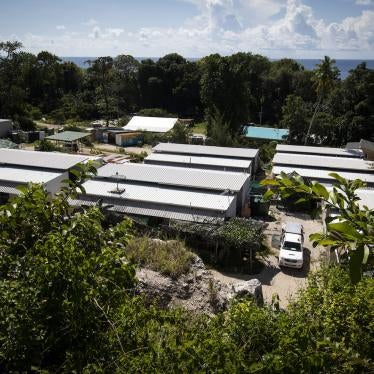Imagine that you are fleeing your country to escape persecution and have survived a treacherous sea journey towards Australia’s shores. Imagine further that based solely on your country of origin, you could be “screened out” after a brief interview and sent back to the country you fled, while other asylum seekers get a full refugee status assessment.
Perhaps if you were from Switzerland or Sweden, it would be fair for Australia to make you undergo a pre-screening interview on the presumption that the country you came from is safe. But what if you are from Sri Lanka, a country barely recovering from a brutal and lengthy civil war whose government continues to oppress its own people?
Australia is a party to the international refugee convention and has bound itself to adhere to its provisions. But it is playing fast and loose with its obligations, and the “enhanced screening” process it has adopted creates a presumption that the refugee claims of asylum seekers from Sri Lanka are probably unfounded.
Enhanced screening, according to the Australian government, is justified when “[c]ountry of origin information suggests that the cohort is not generally considered to be ‘at risk’ in that country.” Sri Lanka is the only country Australia is known to have designated for enhanced screening, though recent reports and a statement by immigration minister Scott Morrison indicate that Australia may have expanded the process to target Vietnamese asylum seekers. But Human Rights Watch and other human rights organisations continue to document allegations of torture and ill-treatment in Sri Lanka, and harsh political persecution in Vietnam.
In August, the United Nations high commissioner for human rights, Navi Pillay, called Sri Lanka “a country where critical voices are quite often attacked or even permanently silenced” and warned that ''surveillance and harassment appears to be getting worse.” The regional representative of the UN high commissioner for refugees, Richard Towle, called enhanced screening “unfair and unreliable”. The Australian Human Rights Commission said it should be terminated.
Australia is also treating asylum seekers who arrive unauthorised by boat more harshly than asylum seekers arriving by other means. Transferring asylum seekers to third countries, like it currently does with Papua New Guinea (PNG and Nauru, does not by itself violate international law, but shoving them off to countries that lack the capacity to receive them, assess their claims, and integrate those found to be refugees certainly demonstrates an abdication of responsibility. The Australian Human Rights Commission recently urged the government to “ensure that adequate safeguards are in place in those countries.”
Neither country has adequate safeguards. At the time PNG entered into the transfer agreement with Australia, it had just adopted a regulation that excluded from refugee status any asylum seeker who “has, during the period of his or her residency at the regional processing centre anywhere or within PNG, exhibited a demeanor incompatible with a person of good character and standing.” The refugee convention sets out reasons why someone may be denied refugee status, such as committing a war crime or a crime against humanity. Yet PNG lumps a detention center guard’s personal assessment of an asylum seeker’s demeanour with these very serious crimes as a ground for exclusion from the refugee convention’s protection.
PNG may have ratified the refugee convention, but its implementation is deeply flawed. It has seven reservations—formal legal objections—to the treaty, including regarding refugees’ right to work, education, freedom of movement, and protection from expulsion. PNG said it would withdraw these reservations for people transferred from Australia, but has given no indication that it has fulfilled this promise. Nauru passed legislation in 2012 that codified the rights set out in the refugee convention, but it subjects all asylum seekers transferred from Australia to mandatory, arbitrary detention in abysmal conditions and has made only one refugee status determination in a year.
Asylum seekers fleeing Sri Lanka, a country that is not obviously safe for many of its citizens, deserve to have their claims heard to the same extent as any other asylum seeker. By turning around boats “where it is safe to do so,” and entering into agreements with neighbouring countries with far less capacity to assess refugee claims and provide protection, Australia not only skirts the letter of the refugee convention but tramples its spirit.
Elaine Pearson is Australia Director and Mary Laurie is a fellow in the Refugee Program




